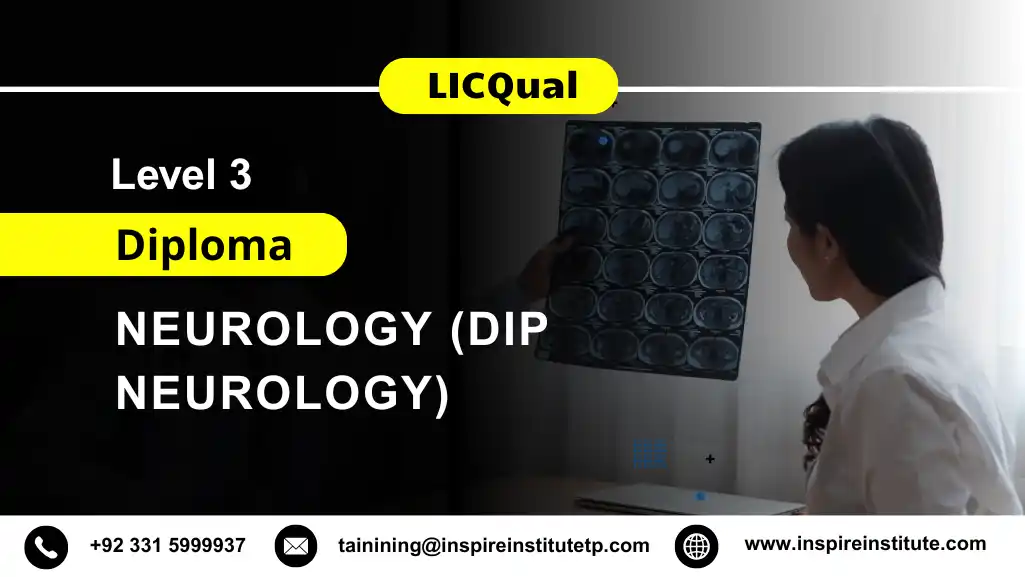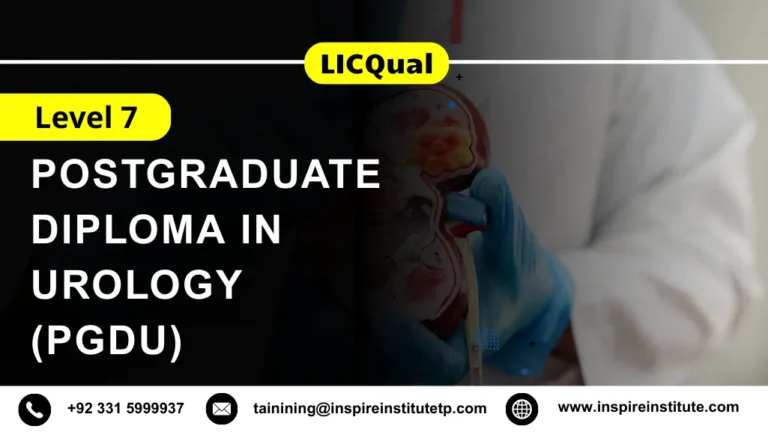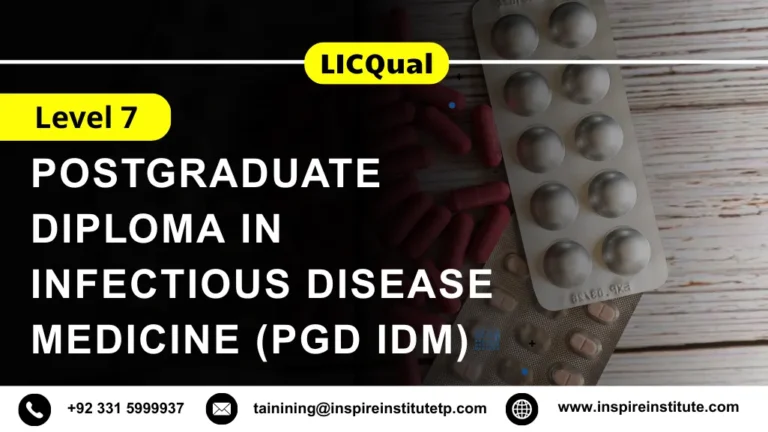LICQual Level 3 Diploma in Neurology (Dip Neurology)
The LICQual Level 3 Diploma in Neurology (Dip Neurology) is a UK-accredited qualification designed for learners who aspire to gain advanced knowledge and practical competence in the field of neurology. Neurological health is one of the most vital areas of medicine, addressing conditions that impact the brain, spinal cord, and nervous system. With the rising prevalence of neurological disorders globally, there is an increasing demand for professionals trained in neurology care and management. This diploma provides the perfect pathway for individuals seeking to strengthen their expertise and contribute meaningfully to patient care.
The Neurology Diploma offers a structured approach to understanding the anatomy, physiology, and pathology of the nervous system. Learners explore the diagnosis and management of common and complex neurological disorders such as epilepsy, stroke, dementia, Parkinson’s disease, and multiple sclerosis. The course also emphasizes the importance of clinical assessments, ethical practice, and evidence-based approaches to neurology care, ensuring graduates are prepared for both academic advancement and professional application.
Through this Neurology Course, participants gain practical insights into neurological examinations, patient care techniques, and therapeutic interventions. Learners also develop critical problem-solving skills required to assess and support patients effectively. The programme bridges theoretical knowledge with hands-on application, making it highly valuable for healthcare professionals, medical students, and allied health practitioners.
As a UK-recognised neurology qualification, the diploma validates learners’ skills and enhances their credibility in clinical and academic settings. This recognition ensures alignment with international healthcare standards, providing opportunities for global career advancement. Graduates are well-positioned to pursue roles in hospitals, clinics, rehabilitation centers, and research institutions focused on neurology and neuroscience.
One of the key advantages of the LICQual Level 3 Diploma in Neurology is its flexible, assignment-based learning pathway. This allows learners to progress academically while balancing professional responsibilities, making it accessible for those already working in healthcare as well as individuals entering the field. The course is tailored to support learners at different stages of their career journey.
Overall, the Dip Neurology qualification equips learners with the knowledge, skills, and professional recognition required to excel in neurology. By completing this course, participants contribute to better patient outcomes, improved healthcare services, and advancements in the treatment and management of neurological disorders. It is an ideal choice for those committed to building a rewarding career in the medical and healthcare sector.
Why Choose this Qualification
The LICQual Level 3 Diploma in Neurology (Dip Neurology) is a specialized qualification designed to build essential knowledge and skills for those aspiring to work in neurological healthcare. Neurology is a critical field of medicine that focuses on the diagnosis, treatment, and management of disorders affecting the brain, spinal cord, and nervous system. Choosing this diploma not only strengthens your academic and professional foundation but also prepares you for a meaningful career where you can contribute significantly to improving neurological health and patient care.
Key Reasons to Choose this Qualification
Comprehensive Understanding of Neurology
- Gain a solid foundation in neuroanatomy, neurophysiology, and neurological disorders.
- Learn about the diagnosis and management of conditions such as epilepsy, stroke, dementia, and Parkinson’s disease.
- Study preventive approaches in neurology, including lifestyle, rehabilitation, and early intervention.
- Understand neurological assessment techniques and diagnostic procedures.
Practical Skills for Real-World Healthcare
- Acquire hands-on knowledge of neurological examinations and patient care.
- Learn essential skills to support patients with chronic neurological conditions.
- Apply evidence-based practices in clinical neurology for effective treatment outcomes.
- Develop critical thinking and problem-solving skills for complex neurological cases.
Career-Ready Qualification
- Enhance employability with specialized skills in neurology and clinical healthcare.
- Prepare for entry-level roles in hospitals, rehabilitation centers, and neurology clinics.
- Build a strong foundation for progressing into advanced neurology or neuroscience studies.
- Demonstrate competence with a UK-accredited and internationally recognized qualification.
Strong Focus on Patient-Centered Care
- Develop effective communication skills for interacting with patients and families.
- Learn to apply empathy and ethical principles in managing neurological disorders.
- Understand the social and psychological aspects of neurological care.
- Gain confidence in supporting patients throughout their treatment and recovery journey.
Internationally Recognized Qualification
- Earn a diploma awarded by LICQual, renowned for academic excellence.
- Open doors to global career opportunities in neurology and medical sciences.
- Gain recognition and credibility among employers and healthcare professionals worldwide.
- Use this qualification as a stepping stone for advanced certifications and postgraduate studies.
Flexible and Structured Learning
- Benefit from a structured curriculum tailored to progressive learning in neurology.
- Study at your own pace with assignment-based assessments designed to test real understanding.
- Access comprehensive study resources aligned with clinical neurology training.
- Balance your studies with professional and personal responsibilities effectively.
Ethical and Professional Development
- Gain insights into professional conduct, ethics, and patient confidentiality in neurology.
- Understand safeguarding principles and rights of patients with neurological disorders.
- Learn to make responsible, evidence-based decisions in clinical practice.
- Build leadership qualities for future roles in neurology and healthcare management.
Contribution to Society and Patient Well-Being
- Play a key role in improving outcomes for patients with neurological conditions.
- Support healthcare initiatives for reducing the burden of neurological diseases.
- Contribute to research, community health, and patient advocacy in neurology.
- Build a career that provides personal fulfillment and professional impact.
The LICQual Level 3 Diploma in Neurology (Dip Neurology) is more than just an academic qualification; it is a pathway to a rewarding career in healthcare. With its blend of theoretical knowledge, practical skills, ethical training, and international recognition, this diploma equips learners to make a meaningful contribution to neurology. By choosing this qualification, you are investing not only in your career but also in advancing neurological healthcare and improving the quality of life for patients worldwide.
Course Overview
LICQual UK Awarding Body
Average Completion Time:
4-12 Months
Study Units: 6 Units
Evidence & Assignment Based
Mandatory Units
Who Should Take This Course
The LICQual Level 3 Diploma in Neurology (Dip Neurology) is a specialized qualification designed for individuals who are passionate about neurological healthcare and aspire to build a strong foundation in neurology. Neurological care is a vital field of medicine, focusing on disorders of the brain, spinal cord, and nervous system. This diploma equips learners with the technical knowledge, clinical understanding, and practical skills necessary to enter healthcare professions or advance to higher-level studies, making it a suitable choice for a wide range of learners.
This Course is Suitable For
Aspiring Neurology Healthcare Professionals
- Build a solid understanding of neuroanatomy, neurophysiology, and neurological disorders.
- Learn to recognize and manage common conditions such as epilepsy, stroke, and dementia.
- Develop skills in conducting neurological assessments and patient monitoring.
- Gain confidence in applying neurological knowledge in real-world healthcare settings.
Nursing and Healthcare Assistants
- Enhance expertise in caring for patients with neurological conditions.
- Improve practical skills in monitoring neurological signs and responding to emergencies.
- Strengthen communication techniques for supporting patients and families.
- Acquire internationally recognized skills to advance within healthcare careers.
Medical Students and Early Career Practitioners
- Use this diploma as a foundation for further neurology or general medical studies.
- Gain early exposure to neurological practices, ethics, and professional standards.
- Build the ability to apply evidence-based medicine in neurological healthcare.
- Develop problem-solving and clinical decision-making skills for complex cases.
Allied Health Professionals
- Strengthen neurology knowledge to support multidisciplinary healthcare teams.
- Learn preventive approaches and rehabilitation strategies in neurology.
- Improve patient care delivery through applied neurology principles.
- Gain specialized skills that complement existing healthcare qualifications and roles.
Community Health Workers and Caregivers
- Acquire essential skills to support neurological health in local and community settings.
- Learn to identify early signs and symptoms of neurological disorders.
- Develop preventive healthcare practices for reducing the burden of neurological conditions.
- Enhance ability to deliver health education and patient support to families.
Individuals Seeking a Career Change into Healthcare
- Begin a career in healthcare with a recognized qualification in neurology.
- Gain specialized knowledge without requiring a prior medical background.
- Acquire transferable skills suitable for hospitals, clinics, and NGOs.
- Build confidence to progress into advanced healthcare and neurology studies.
International Learners Aiming for Global Healthcare Careers
- Earn a globally recognized diploma that boosts employability worldwide.
- Gain knowledge aligned with international neurology and healthcare standards.
- Strengthen professional profiles for roles in hospitals, clinics, and rehabilitation centers abroad.
- Open pathways for higher education and advanced neurology studies globally.
Volunteers and NGO Workers in Neurological Health Programs
- Develop expertise to contribute effectively to neurological health initiatives.
- Learn the essentials of neurology relevant to outreach and community care.
- Improve ability to deliver support services in neurological rehabilitation projects.
- Gain confidence in making a positive impact on vulnerable patients and communities.
The LICQual Level 3 Diploma in Neurology (Dip Neurology) is ideal for anyone committed to advancing neurological healthcare and patient well-being. Whether you are an aspiring medical professional, a current healthcare practitioner, or someone seeking to transition into the medical field, this qualification provides the knowledge, skills, and global recognition needed to succeed in neurology. By choosing this course, learners position themselves for career growth while contributing to the improvement of neurological care worldwide.
Course Benefits
The LICQual Level 3 Diploma in Neurology (Dip Neurology) provides significant benefits for individuals seeking to build expertise in neurological sciences, nervous system functions, and clinical neurology practices. By combining essential theoretical knowledge with practical applications, this diploma equips learners to deliver high-quality neurological care, manage common neurological conditions, and support preventive healthcare strategies. Designed as a flexible, assignment-based programme, it ensures professional development while maintaining academic excellence and relevance in today’s healthcare sector.
Key Benefits of the Course:
- Specialist Knowledge: Gain a solid foundation in neuroanatomy, neurophysiology, and the structure and function of the nervous system. Learners explore major neurological disorders including stroke, epilepsy, Parkinson’s disease, Alzheimer’s disease, and multiple sclerosis. The course also covers diagnostic methods, neurological rehabilitation, and preventive healthcare approaches. Ethical and patient-centered practices are emphasized, preparing learners to make informed and evidence-based decisions in neurology.
- Practical Application: Develop practical skills in conducting neurological assessments, recognizing early signs of nervous system disorders, and supporting early diagnosis. Learners gain competence in handling neurological emergencies, assisting in rehabilitation processes, and applying best practices in hospitals, clinics, and community health settings. The programme ensures graduates can apply theoretical learning directly to real-world neurology and patient care.
- Recognised Qualification: Earn a UK-accredited diploma that validates advanced knowledge in neurology and strengthens professional credibility. This recognition ensures alignment with international healthcare and neurological science standards, making the qualification valuable for careers in hospitals, neurology units, research institutions, NGOs, and healthcare organizations worldwide.
- Flexible Learning Pathway: Benefit from an assignment-based study model that allows learners to continue personal or professional responsibilities while progressing academically. This flexible approach makes the LICQual Level 3 Diploma in Neurology (Dip Neurology) ideal for healthcare assistants, medical students, allied health professionals, and career changers seeking a structured yet accessible programme.
- Evidence-Based Training: Explore the latest guidelines and research in neurology, clinical neuroscience, and preventive medicine, ensuring that learners can adopt patient-centered, safe, and effective approaches. Training emphasizes early detection of neurological conditions, rehabilitation techniques, and evidence-driven healthcare interventions that support both individual patients and broader healthcare outcomes.
- Career Development: Expand career opportunities across hospitals, neurology clinics, rehabilitation centers, research labs, and international health organizations. The diploma opens pathways into roles in neurology support, allied health services, and patient care, as well as advanced medical studies in neuroscience and related fields.
- Enhanced Neurological Healthcare Delivery: Contribute to better neurological health outcomes through accurate assessment, timely care, and patient support. Learners acquire the skills to support individuals and families affected by neurological disorders, promote rehabilitation, and strengthen healthcare systems to meet the growing needs of neurological care worldwide.
- Professional Growth: Strengthen clinical knowledge, decision-making, and communication skills essential for working with patients and families in neurology. The course also builds professional values such as empathy, ethics, and interdisciplinary collaboration, preparing learners to play a crucial role in neurological healthcare delivery.
The LICQual Level 3 Diploma in Neurology (Dip Neurology) equips learners with vital knowledge, applied competence, and a UK-recognised qualification. It empowers healthcare professionals and aspiring practitioners to improve neurological health outcomes, contribute to public health initiatives, and advance their careers in the challenging yet rewarding field of neurology.
Eligibility Criteria
The LICQual Level 3 Diploma in Neurology (Dip Neurology) is a UK-accredited programme designed for aspiring healthcare professionals, medical students, allied health practitioners, and caregivers who wish to develop a strong foundation in neurological sciences, nervous system functions, and clinical neurology. This assignment-based qualification combines essential theoretical knowledge with practical applications, making it ideal for nurses, laboratory staff, healthcare assistants, and individuals looking to specialize in neurology. By meeting the entry requirements, learners ensure they are fully prepared to succeed in the programme and apply their knowledge effectively in hospitals, neurology clinics, rehabilitation centers, and community healthcare settings.
Educational Background:
Applicants should hold a recognised healthcare or science-related qualification such as a diploma in healthcare practice, nursing, biomedical science, or an equivalent qualification. Candidates with Level 2 or Level 3 qualifications in healthcare, clinical science, biology, or related fields may also be considered. Equivalent international qualifications will be reviewed on a case-by-case basis to ensure they meet the suitability standards for the programme.
Professional Experience:
While previous experience in neurology, neuroscience, or general healthcare is beneficial, it is not strictly mandatory. A minimum of one year of healthcare, clinical, or laboratory experience is recommended. Applicants with exposure to patient care, diagnostic testing, or neurological support services will find the course particularly valuable, though motivated individuals without direct experience are also encouraged to apply.
Age Requirement:
Learners must be at least 18 years of age at the time of enrolment, ensuring they possess the maturity, responsibility, and commitment required for training in neurology. This requirement ensures that candidates can engage with both the academic and practical aspects of the qualification effectively.
Language Proficiency:
Since the programme is delivered in English, learners should demonstrate strong reading, writing, and communication skills. A minimum IELTS score of 6.0 or an equivalent qualification is recommended for non-native English speakers. This ensures that learners can complete assignments, engage with course resources, and interact professionally in academic and healthcare contexts.
Technical Requirements:
Applicants should have access to a computer or laptop with a stable internet connection. Basic IT skills are necessary to manage online learning platforms, conduct research, and submit assignments digitally. Familiarity with using word processing tools and accessing digital study resources will support a smoother learning experience.
Required Documents:
Submission of a valid ID or passport, proof of educational qualifications, and evidence of any healthcare or related professional experience (if applicable) is required for registration. Applicants presenting international qualifications may be asked to provide additional documentation for verification.
The Qualification Process
LICQual Level 3 Diploma in Neurology (Dip Neurology) follows a structured pathway to ensure learners gain comprehensive knowledge, practical skills, and professional competence in community oral healthcare.
Step 1: Self-Assessment
Learners review the entry requirements to confirm eligibility. Candidates with a background in dentistry, oral health, or public health are encouraged to apply.
Step 2: Registration
Complete the registration process by submitting required documents such as proof of qualifications, a valid ID, and payment of enrollment fees.
Step 3: Induction
An induction session is conducted to:
- Verify learner eligibility and documentation.
- Introduce study materials, learning outcomes, and assessment procedures.
Step 4: Learning and Evidence Submission
Learners complete assignments, case studies, and practical exercises demonstrating competence in public health dentistry, community oral health assessment, preventive strategies, and program planning.
Step 5: Feedback and Revision
Assessors review submitted evidence and provide constructive feedback. Learners can revise and resubmit work to meet all required standards.
Step 6: Competence Validation
Final submissions are evaluated to confirm that learners have met all theoretical and practical learning outcomes.
Step 7: Internal Quality Assurance (IQA)
The IQA team reviews the assessment process to ensure accuracy, fairness, and compliance with international standards.
Step 8: External Verification (EQA)
External verifiers validate the authenticity and quality of learner achievements.
Step 9: Certification
Upon successful verification, learners are awarded LICQual Level 3 Diploma in Neurology (Dip Neurology), demonstrating advanced proficiency in community oral healthcare and preparing them for professional growth in dental public health, preventive dentistry, and healthcare policy.







